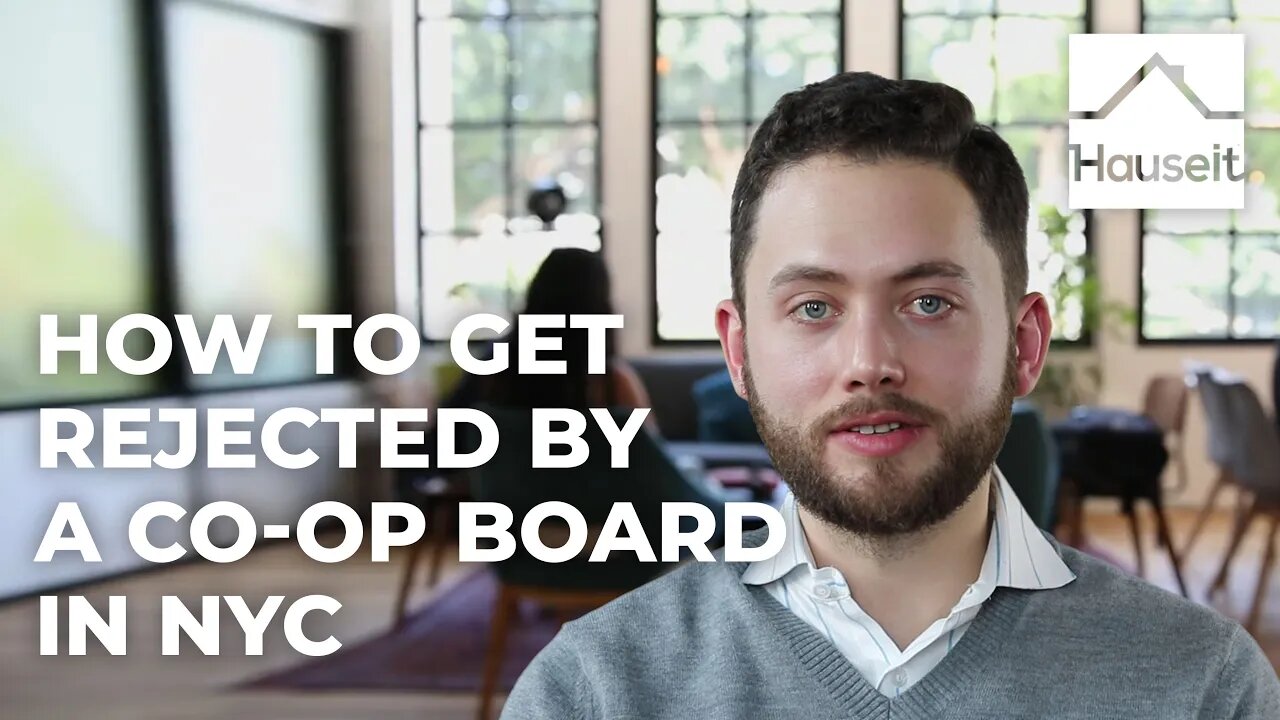Premium Only Content

How to Get Rejected by a Co-op Board in NYC
Save 2% When Buying in NYC: https://www.hauseit.com/hauseit-buyer-closing-credit-nyc/
NYC Buyer Closing Cost Calculator: https://www.hauseit.com/closing-cost-calculator-for-buyer-nyc/
How to get rejected by a co-op board in New York City? Now this is not something you want but by understanding how you might get rejected, it might increase your chances of not being rejected. So in this video, we will demystify the topic of co-op board rejections here in New York City. My name is Nick and I am with Hauseit, we are the largest discounted commission platform for buyers and sellers here in New York City so let's get started.
So getting rejected by a co-op board, it's a nightmare scenario that you read about in the newspaper and which you might hear in conversations at a bar or at dinner with your friends. It is something that doesn't happen very often despite what the headlines may suggest. But if and when it does, it can be totally devastating as far as a cost and lifestyle perspective is concerned.
So in this video, we're going to talk about some of the most obvious ways you can get rejected by a co-op. The first way you can get rejected by a co-op is not conforming to the buyer financial requirements and what do we mean by financial requirements for a co-op purchaser? Well, we're referring to the debt to income ratio and post-closing liquidity. Most coops in New York City are very focused on ensuring that the debt to income ratio for a purchaser is approximately 25% to 30%. So an easy way to get rejected is if your debt to income ratio is much higher than the guidelines. Now keep in mind each building has its own guideline some buildings don't actually state what they are and for the buildings that do have guidelines they will also have their own unique formula for calculating DTI debt to income ratio.
For example, while one building may allow you to count your most recent high bonus for the debt to income ratio, a more conservative building might require you to utilize it to your average or they might not allow you to include overtime at all. In some cases, the building might not allow passive income such as dividend or other stock or passive investment related earnings. So as you can see, the debt to income ratio itself can be quite complex. Your buyer's agent should be able to help you navigate this and again it does vary by building. So, to minimize the risk of a board rejection you really want to get into the weeds here and make sure that you've done the calculation correctly and you are to the best of your knowledge in line with the building's guidelines. Similarly, post-closing liquidity is a measurement of how much money you have left over in liquid assets you've closed and after you've made your down payment and accounted for closing costs.
Post closing liquidity is defined by the number of months or years you can continue to pay your apartments carrying costs the maintenance and the mortgage after you've closed using liquid assets only. The devil is in the details here because co-op's a different requirements for how much you need and they have different methodologies to figure out what assets you should use when calculating this. So again, you do need to do your homework in conjunction with your buyer's agent just to make sure that you ostensibly do meet whatever guidelines the coop may put forth. Another easy way to get rejected by a co-op is to have a purchasing structure that is simply not permitted by a building so what do we mean by purchasing structure? Well, take for example co purchasing or purchasing with the guarantor.
Each co-op will have its own set of policies restrictions on these types of purchasing arrangements one building might permit guarantors another might not permit co purchasing other unique forms of purchasing include parents buying for children or children buying for parents and again all of these cops will have policies that can tell you whether or not something like this would be permitted. So even if a listing agent isn't concerned and you haven't accepted offer, you don't want to sign that contract until you've confirmed that equivocally that whatever purchase structure you have in mind assuming it's just not you or your partner just buying a home is actually permitted by the co-op.
Save 2% When Buying in NYC: https://www.hauseit.com/hauseit-buyer-closing-credit-nyc/
NYC Buyer Closing Cost Calculator: https://www.hauseit.com/closing-cost-calculator-for-buyer-nyc/
.
.
Hauseit LLC, Licensed Real Estate Broker
Tel: (888) 494-8258 | https://www.hauseit.com
_
#hauseit #hauseitnyc
-
 10:27
10:27
Tactical Advisor
1 day agoDMR or SPR for Civilian Use?
25.3K5 -
 8:21
8:21
DEADBUGsays
1 day agoThe Crossbow Killer
12.1K8 -
 8:40
8:40
Tundra Tactical
20 hours ago $6.74 earnedThe Executive Order Wishlist.
33.8K3 -
 7:22:52
7:22:52
SpartakusLIVE
19 hours agoSaturday SPARTOON Solos to Start || Duos w/ StevieT Later
112K2 -
 28:40
28:40
SLS - Street League Skateboarding
8 days agoTOP MOMENTS IN WOMEN’S SLS HISTORY! ALL THE 9’s - Rayssa Leal, Leticia Bufoni, Chloe Covell & more…
80.2K10 -
 2:03:03
2:03:03
The Connect: With Johnny Mitchell
17 hours ago $5.01 earnedHow Mexican & Chinese Cartels Control Illegal Marijuana Cultivation In America Using SLAVE Labor
28.4K5 -
 14:46
14:46
Mrgunsngear
18 hours ago $2.80 earnedPrimary Arms GLx 1x Prism With ACSS Reticle Review
35.8K8 -
 22:37
22:37
Degenerate Plays
17 hours ago $0.55 earnedI'm A Psychic Now - Elden Ring : Part 73
20.7K -
 2:32:02
2:32:02
Jamie Kennedy
11 hours agoEp. 195 Horror Legend Barbara Crampton
24.1K1 -
 23:00
23:00
Exploring With Nug
1 day ago $34.16 earnedHis Truck Was Found Crashed in the Woods… But He’s Gone!
145K9